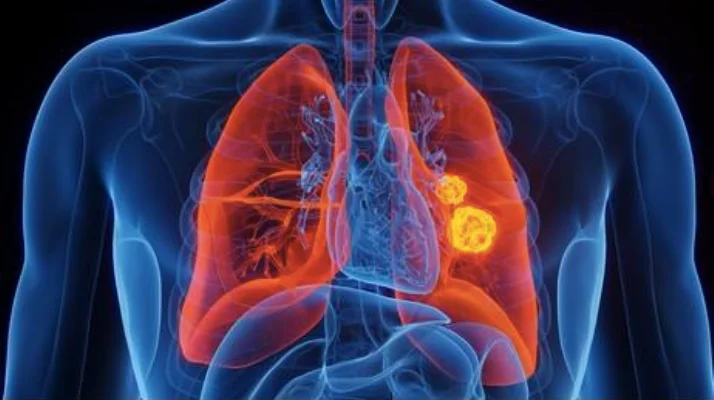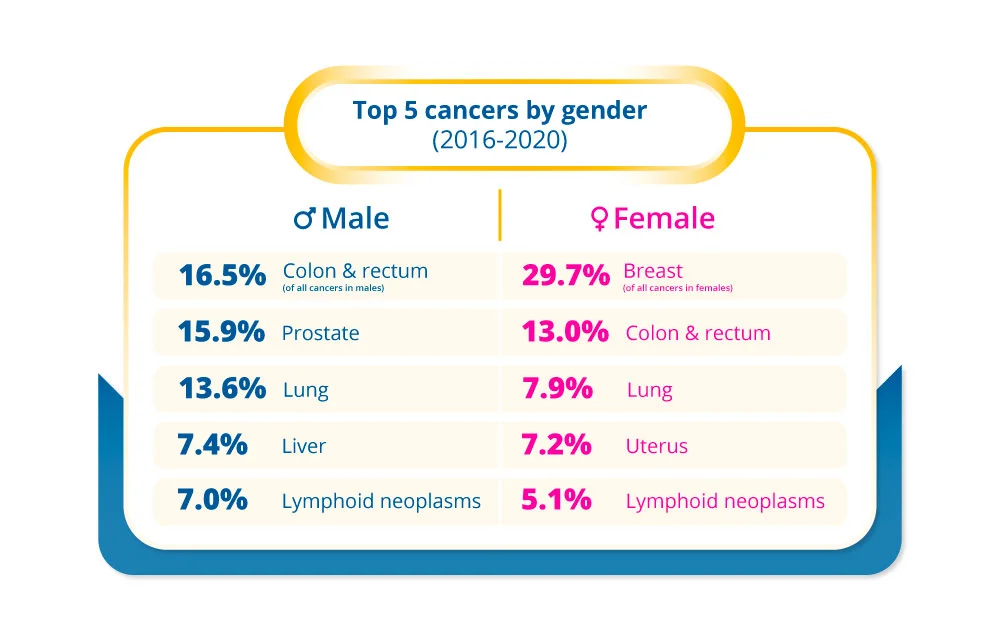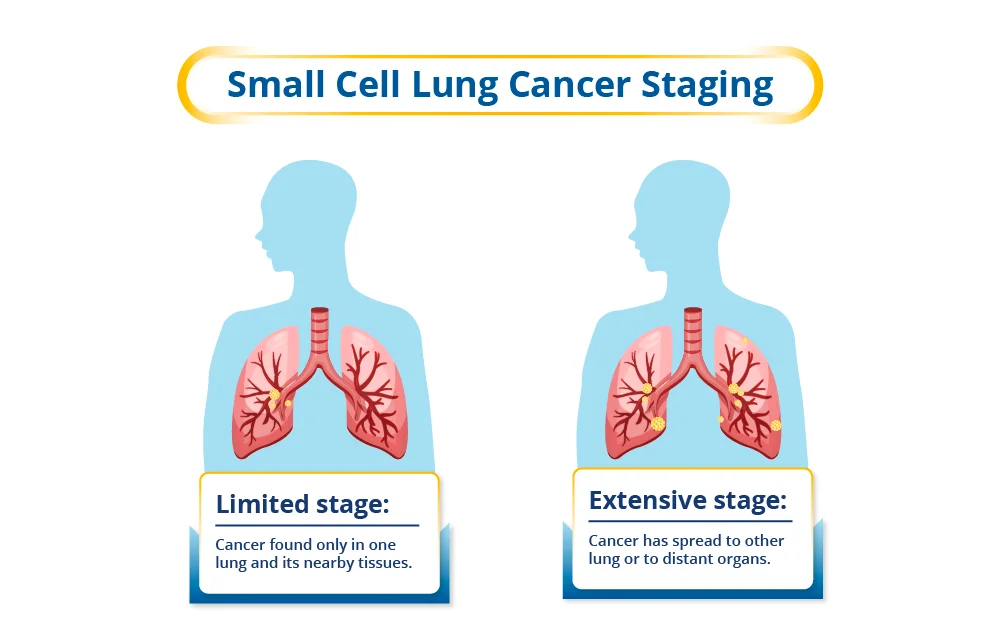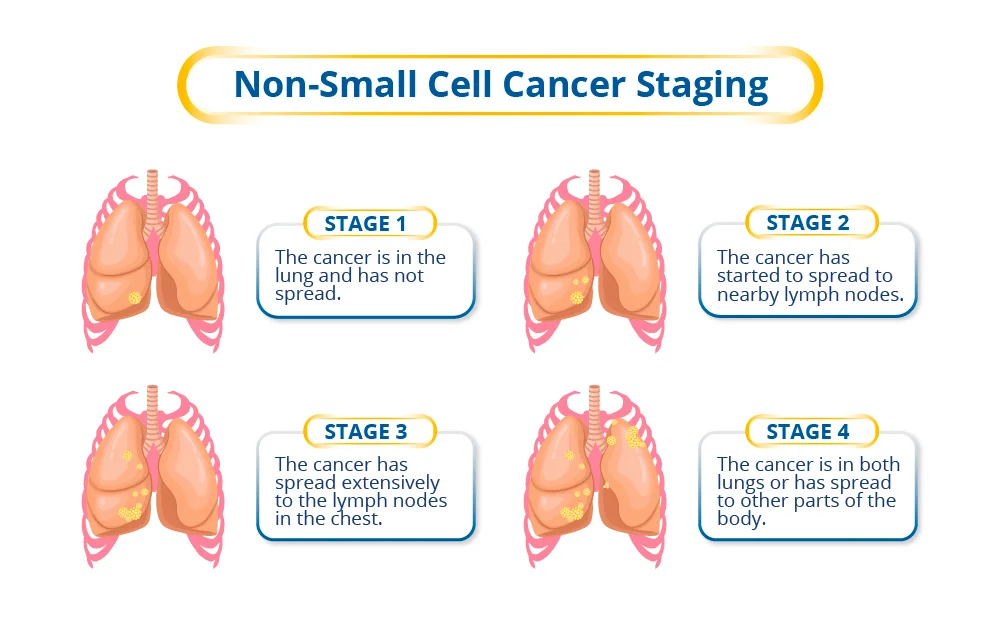Lung Cancer
Overview
What is Lung Cancer?

Lung cancer originates from tissues of the lung. Most lung cancers begin in the cells lining the air passages.
How Common is Lung Cancer?

In Singapore, lung cancer is the third most common cancer diagnosed in both males and females, accounting for over 13% of all cancers in males and almost 8% of all cancers in females1. Lung cancer is more likely to occur as people get older. Most people with this disease are diagnosed after the age of 65 years2.
The worldwide number of lung cancer cases and deaths closely mirror the tobacco epidemic with a lag of several decades2. As public health messaging reached the community, more people became aware of the dangers of smoking and were motivated to quit or not to start smoking at all.
There is a steady downward trend in the number of lung cancer cases over the past couple of decades as the number of people smoking continues to decline2. Recent advances in the treatment of lung cancer as well as increased detection of early-stage cancer through screening have also contributed to the improvement in lung cancer survival2.
Types of Lung Cancer
The two main types are small cell lung cancer (SCLC) and non-small cell lung cancer (NSCLC). This is diagnosed based on how the cells look under a microscope:
Non-small cell lung cancer (NSCLC)
NSCLC is the more common type of lung cancer, comprising of approximately 80% of lung cancers. It is less aggressive than SCLC. If discovered early, surgery and/or radiation therapy, chemotherapy may offer a chance of cure.3
Small cell lung cancer (SCLC)
SCLC is fast-growing and rapidly spreads through the bloodstream and lymphatics to other parts of the body. It is often advanced at diagnosis. It is usually treated with chemotherapy alone or in combination with radiotherapy.3
Causes & Symptoms
Lung Cancer Risk Factors
Doctors cannot always explain why one person develops lung cancer and another does not. However, we do know that a person with certain risk factors may be more likely than others to develop lung cancer4,6:
Smoking
People who smoke have by far the greatest risk of lung cancer. This risk increases with the length of time and number of cigarettes smoked. Cigar smoking, pipe smoking, low-tar or 'light' cigarettes and menthol cigarettes all carry a similar risk as regular cigarette smoking.Exposure to secondhand smoke
Your risk of lung cancer increases if you are regularly exposed to secondhand smoke, for example, if a member of your household smokes.Exposure to certain substances
Some substances such as radon (a radioactive gas), asbestos, arsenic, chromium and nickel found in buildings, workplaces and environment can increase lung cancer risk, particularly in smokers.Previous radiation to the chest
People who had radiation therapy to the chest for other cancers are at higher risk for lung cancer.Personal history
If you have had lung cancer, you are more likely to develop another lung cancer.Family history
People with a first-degree relative (parent, sibling or child) with lung cancer have an increased risk of the disease, especially if the relative was diagnosed at a younger age. It is not clear how much of this risk is due to shared genes and how much is from shared household exposure.
What are the Signs and Symptoms of Lung Cancer?
Early lung cancer often does not cause symptoms. But as the cancer grows, common symptoms may include7:
- A cough that gets worse or does not go away
- Breathing difficulties, such as shortness of breath
- Constant chest pain
- Coughing up blood
- A hoarse voice
- Frequent lung infections, such as pneumonia
- Feeling very tired all the time
- Weight loss with no known cause
These symptoms may not be due to cancer as other health problems can cause some of these symptoms. However, anyone with such symptoms which persists should see a doctor to be diagnosed and treated as early as possible.
Diagnosis & Assessment
Diagnosis of Lung Cancer
If you have symptoms that suggest lung cancer, your doctor will do further tests to ascertain the cause of your symptoms. You may be required to do some blood tests and X-rays or scans.8
Clinical history and examination
Your doctor will ask about your personal and family medical history and perform a physical examination to look for signs of lung cancer.Chest x-ray
A chest x-ray is often the first test you will do to look for any abnormalities in the lungs. If something suspicious is seen, your doctor may order further tests to get a more detailed picture.Computed Tomography (CT) Scan
A CT scan is a special x-ray machine that takes many pictures and combines them to show greater detail of your lungs. It may reveal small masses in your lungs that may not have been visible on x-ray. It can also see if the lymph nodes are abnormal.
Your doctor may then order one or more of the following tests to collect samples to confirm the diagnosis if there is a high suspicion of lung cancer8:
Bronchoscopy
The doctor inserts a thin, lighted tube (a bronchoscope) through the nose or mouth into the lung. The doctor may take a sample of cells with a needle, brush, or other tool. The doctor also may wash the area with water to collect cells in the water.Thoracocentesis
If there is fluid collected around the lungs (pleural effusion), the doctor can collect some fluid via a needle inserted through the skin.CT guided biopsy
The doctor uses a thin needle to remove tissue or fluid from the lung under the guidance of a CT scan.Open biopsy
In cases where the tumour tissue is difficult to obtain, direct biopsy of the lung tumour or lymph nodes through an incision in the chest wall may be needed.
How is Lung Cancer Assessed?
After lung cancer has been diagnosed, tests are done to determine if the cancer cells have spread from the lungs to other parts of the body.
To plan the best treatment, apart from the type of lung cancer, your doctor needs to know the extent (stage) of the disease. Staging, usually done with CT scans, PET-CT scans or MRI, is done to find out whether the cancer has spread, and if so, to what parts of the body. Lung cancer often spreads to the lymph nodes, brain, bones, liver, and adrenal glands.
Stages of Small Cell Lung Cancer9
Limited stage
Cancer is found only in one lung and its nearby tissues.Extensive stage
Cancer is found in tissues outside of the lung in which it originated from or in distant organs.

Stages of Non–Small Cell Lung Cancer10
Stage 0
Cancer cells are found only in the innermost lining of the lung. The tumour has not grown through this lining. A Stage 0 tumour is also called carcinoma in situ.Stage 1
The cancer is in the lung only and has not spread to the lymph nodes.Stage 2
The cancer has spread to nearby lymph nodes, chest wall, diaphragm, lining of the lungs, or the outer lining that surrounds the heart.Stage 3
The cancer has spread extensively to the lymph nodes in the chest between the heart and lung but has not spread to other distant parts of the body.Stage 4
The cancer has spread to both lungs, to fluid around the lungs or heart, or to other distant parts of the body.

Treatment of Lung Cancer
Lung Cancer Treatment Options
Depending on the stage of the lung cancer, the aims of treatment may be for cure, control of disease for prolongation of survival or management of symptoms and prevention of complications to improve quality of life.
For localised non-small cell lung cancers, treatment consists of surgery with or without chemotherapy, radiation alone or combined chemotherapy and radiation11.
For more advanced non-small cell lung cancers that have spread, treatment may consist of chemotherapy and radiotherapy, with the addition of targeted therapy and immunotherapy in select cases11.
Most small cell lung cancers are treated with chemotherapy with or without radiotherapy and immunotherapy. In all cases, treatment selection depends on the patient’s overall health and preferences as well as characteristics of the tumour (e.g. size, location, type, stage). The following treatment modalities may be used singly or in combination13:
Surgery
Surgery for lung cancer involves the removal of tissues that contain the tumour and nearby lymph nodes. This could be done by wedge resection (removal of a portion of lung), lobectomy (removal of an entire lobe of the lung) or pneumonectomy (removal of the entire lung).Radiation therapy (Radiotherapy)
Radiotherapy uses high energy rays to kill cancer cells. It affects cells only in the treated area. For people with locally advanced disease, it may be used before or after surgery, and is often combined with chemotherapy.Chemotherapy
Chemotherapy uses anticancer drugs to kill cancer cells. This is usually given as an infusion. The drugs enter the bloodstream and can affect cancer cells all over the body.Targeted Therapy
Targeted therapy focus on specific abnormalities present within cancer cells. By blocking these abnormalities, targeted drug treatments can cause cancer cells to die. Some targeted therapies only work in people whose cancer cells have certain genetic mutations. Your cancer cells may be tested in a laboratory to see if these drugs might help you.Immunotherapy
Immunotherapy refers to a type of cancer treatment designed to enhance one’s body’s immune system to fight cancer cells. Cancer cells have the ability to ‘camouflage’ themselves in such a way that our body’s immune system is unable to detect these ‘rogue cells’ to destroy them.
It is worth noting that lung cancer is treatable at any stage, and these treatments have been shown to help people with lung cancer live longer with better quality of life14. Advances in lung cancer research are being made that will further improve lung cancer treatment and outcomes in the future.
Lung Cancer Survival Rate
Early diagnosis of lung cancer increases the likelihood for cure15.
.webp?sfvrsn=a86b966e_6)
It is important to bear in mind that these rates are estimates and with continued advancements in treatment as well as screening methods, the survival rate for lung cancer is expected to continue to improve.
Prevention & Screening
Lung Cancer Screening
Screening refers to looking for cancer before a person has any symptoms. The aim is to detect cancers early so that it can be treated at an early stage. Screening tests are tests that may help doctors find and treat cancer early.
Several methods of detecting lung cancer have been studied as possible screening tests such as low dose CT lung scans. However, this is only found to be effective in high risk people (mainly smokers or ex-smokers)16.
Hence it is important to talk with your doctor about your own risk factors and the possible benefits and harms of being screened for lung cancer. Like many other medical decisions, the decision to be screened is a personal one. Your decision may be easier after learning the pros and cons of screening.
Lung Cancer Prevention
While there is no guaranteed way to prevent lung cancer, there are some steps you can take to reduce your risk4:
Don’t smoke
If you have never smoked, don’t start! Begin conversations about the dangers of smoking with your children early before peer opinions and pressure kick in.Quit smoking
Quitting reduces your risk of lung cancer even if you have smoked heavily for many years. Speak with your doctor about strategies and supports to help you quit successfully. Options include nicotine replacement products, medication and support groups.Avoid secondhand smoke
If you live or work with someone who smokes, encourage them to quit, or at the very least, smoke outdoors. Choose smoke-free places and avoid areas where people smoke.Avoid workplace exposure
Take precautions and follow all safety guidelines carefully if you work with potential carcinogens such as asbestos, silica, arsenic, chromium and nickel.Check radon levels in your home
If you live in an area where radon is known to be an issue, have your home checked.Eat a healthy diet
A well-balanced diet with plenty of fruit and vegetables is best.Exercise regularly
Stay active, try to exercise most days of the week.
Frequently Asked Questions (FAQ)
While there is no guaranteed way to prevent lung cancer, there are steps that you can take to reduce your risk of developing lung cancer. The best thing you can do is to not smoke, or to quit smoking if you already are.
Avoid exposure to second-hand smoke and other potential carcinogens such as radon, asbestos, silica, arsenic, chromium and nickel. Take precautions and follow safety guidelines if you have to work with these materials. (See Lung Cancer Prevention above for more details)
Smoking exposes the lungs to carcinogens (cancer-causing substances) which damages the cells that line the lungs. At first, your body may be able to repair this damage, but with repeated exposure, these cells become increasingly damaged to the point where they start to act abnormally and become cancer cells.4
Lung cancer often does not cause symptoms in the early stages of the disease. Low dose computed tomography (CT) lung scan is a screening test that can detect early lung cancers and is currently recommended for those with a current or past history of heavy smoking who are at higher risk of getting lung cancer16.
Cancer occurs when abnormal cells grow and multiply in an uncontrolled way. Most lung cancers begin in the cells lining the air passages.
The likelihood of cure from lung cancer depends on several factors, including the type of lung cancer and the stage at diagnosis. The outcome of lung cancer treatment tends to be better when the cancer is found and treated early. Localised, early-stage disease is often curable with surgery to remove the tumour completely.
Not all lung cancers have a poor outcome, and some can be cured. People with widespread, advanced disease tend to have a lower chance of survival. However, ongoing discoveries are being made with regards to new treatment options that help to improve the life expectancy and quality of life of those with advanced lung cancer.
Lung cancer may be curable in the early stages of the disease, when it is localised to one area of the lung or has spread minimally.
Surgery may be able to completely remove the tumour, and chemotherapy and radiation therapy may be used as further treatment after surgery to treat potential cancer cells remaining.
The survival rate for lung cancer continues to improve as exciting advances in treatment options continue to be made2.
References
- National Registry of Diseases Office. Singapore Cancer Registry Annual Report 2020. Singapore, National Registry of Diseases Office; 2022.
- American Cancer Society. Cancer Facts & Figures 2023. Atlanta: American Cancer Society; 2023.
- American Cancer Society. What is Lung Cancer? Accessed at https://www.cancer.org/cancer/types/lung-cancer/about/what-is.html on 11 July 2023.
- Mayo Clinic. Lung Cancer Symptoms and Causes. Accessed at https://www.mayoclinic.org/diseases-conditions/lung-cancer/symptoms-causes/syc-20374620 on 11 July 2023.
- American Cancer Society. What Causes Lung Cancer. Accessed at https://www.cancer.org/cancer/types/lung-cancer/causes-risks-prevention/what-causes.html on 11 July 2023.
- American Cancer Society. Lung Cancer Risk Factors. Accessed at https://www.cancer.org/cancer/types/lung-cancer/causes-risks-prevention/risk-factors.html on 11 July 2023.
- Gleneagles Hospital Singapore. Lung Cancer. Accessed at https://www.gleneagles.com.sg/conditions-diseases/lung-cancer/symptoms-causes on 11 July 2023.
- American Cancer Society. Tests for Lung Cancer. Accessed at https://www.cancer.org/cancer/types/lung-cancer/detection-diagnosis-staging/how-diagnosed.html on 11 July 2023.
- American Cancer Society. Small Cell Lung Cancer Stages. Accessed at https://www.cancer.org/cancer/types/lung-cancer/detection-diagnosis-staging/staging-sclc.html on 11 July 2023.
- American Cancer Society. Non-Small Cell Lung Cancer Stages. Accessed at https://www.cancer.org/cancer/types/lung-cancer/detection-diagnosis-staging/staging-nsclc.html on 11 July 2023.
- American Cancer Society. Treatment Choices for Non-Small Cell Lung Cancer, By Stage. Accessed at https://www.cancer.org/cancer/types/lung-cancer/treating-non-small-cell/by-stage.html on 11 July 2023.
- American Cancer Society. Treatment Choices for Small Cell Lung Cancer, By Stage. Accessed at https://www.cancer.org/cancer/types/lung-cancer/treating-small-cell/by-stage.html on 11 July 2023.
- Mayo Clinic. Lung Cancer Diagnosis and Treatment. Accessed at https://www.mayoclinic.org/diseases-conditions/lung-cancer/diagnosis-treatment/drc-20374627 on 11 July 2023.
- American Society of Clinical Oncology Cancer.Net. Lung Cancer - Non-Small Cell: Statistics. Accessed at https://www.cancer.net/cancer-types/lung-cancer-non-small-cell/statistics on 11 July 2023.
- American Cancer Society. Lung Cancer Survival Rates. Accessed at https://www.cancer.org/cancer/types/lung-cancer/detection-diagnosis-staging/survival-rates.html on 11 July 2023.
- Centers for Disease Control and Prevention. Who Should be Screened for Lung Cancer. Accessed at https://www.cdc.gov/cancer/lung/basic_info/screening.htm on 11 July 2023.
- National Registry of Diseases Office. Singapore Cancer Registry 50th Anniversary Monograph – Appendices. Singapore, National Registry of Diseases Office; 2022.
